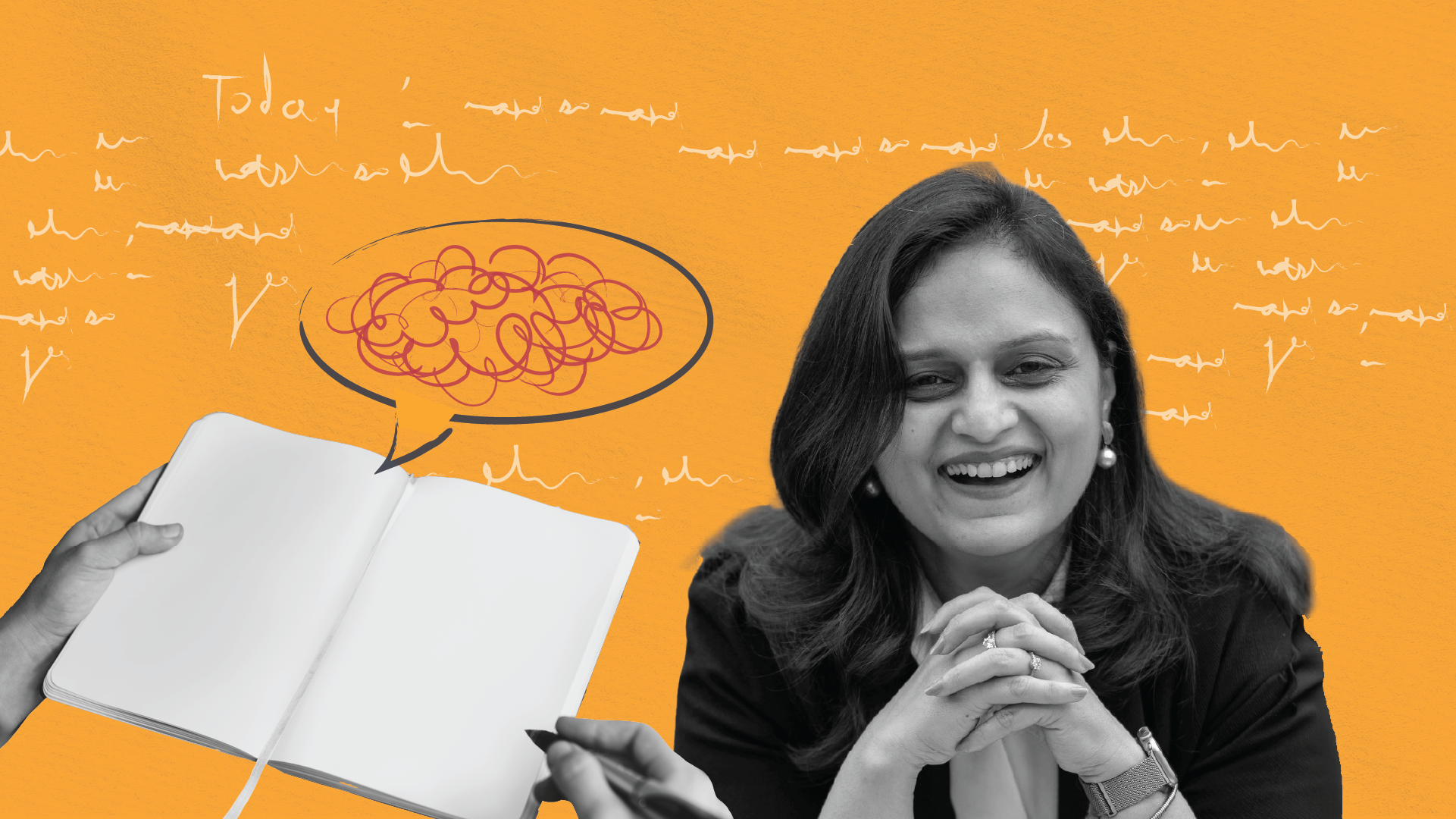“Feeling midlife’s complexities? Medhavi Parmar, a lifelong journaller, explains how this simple practice is a powerful tool for emotional clarity, hormonal health, and rediscovering your true self. Detangle your thoughts and embrace your calling!”
Medhavi Parmar, a 41-year-old Gurgaon resident, has been journaling since her teens and considers it essential for navigating midlife’s complexities. “I can’t emphasize enough how much it helps my brain make sense of everything happening around me,” she explains.
In her conversation with Vidya Raja for Not So Silver, Medhavi explores how journaling serves as more than just a writing practice – it’s a tool for improving hormonal and cognitive health, fostering self-expression, and creating clarity around personal goals and aspirations.
The practice, which began in her teenage years, has evolved into a cornerstone of her wellness routine, particularly valuable during the hormonal and emotional shifts that come with midlife.
Is there a specific way to journal?
“Journalling to me is putting your thoughts out in one format or the other. It could be done using the traditional diary method or using one of the many journalling apps available online, and could even consist of doodles, illustrations, and photographs,” explains Medhavi. She goes on to say, “the method can be whatever you choose – all it should do is capture your emotions and chronicle your life in a sense.”
She warns against making journalling a social goal, which means using social media apps to journal. She says that at some point the goal becomes to make something aesthetic for public consumption and the charm of doing it for yourself might be lost. “Do what pleases you, not what pleases your subscribers.”
A method of rediscovering yourself
Speaking about the benefits of journaling, especially for midlifers, she says, “It’s a method of rediscovering yourself. It forces you to take a step back and ask yourself who you really are. It will help you discover that midlife need not be a crisis, it could well be a calling.” Medhavi equates journaling to investing and says the right time is now, and the amount of time and energy you want to invest is up to you; no amount is too small.
If you’re unsure where to begin, gratitude offers the perfect entry point. The simple act of putting pen to paper, or fingers to keyboard, is already a meaningful first step. Before you even write your first word, you’ve invested precious minutes in reflection, considering what deserves to be captured on the page. The beauty lies not in perfect prose or profound insights, but in the commitment to begin, and in recognizing that the act of beginning is, itself, an act of self-care.
Finding Your journaling rhythm
Is there an ideal time to journal? While morning pages have gained popularity, capturing those first unfiltered thoughts as you wake, there’s beauty in evening reflection too, processing the day’s experiences before sleep. But here’s the truth: there’s no universal “right” time.
The magic happens when you discover your own natural rhythm. Some people need the mental clarity that comes from emptying their thoughts onto paper first thing in the morning. Others find solace in evening journaling, using it to decompress and make sense of their day.
Your journaling practice might be a spontaneous reaching for your notebook when anger needs an outlet or joy demands expression. It could be triggered by specific emotions or life events rather than following a rigid schedule.
What matters most isn’t the clock on the wall, but consistency in showing up for yourself. Whether it’s five minutes every morning with your coffee, a few pages before bed, or whenever your heart feels full or heavy, find what works for you and stay with that rhythm.
Journaling offers profound benefits that extend far beyond simply recording daily events.
Here’s how this simple practice can transform different aspects of your life:
Emotional clarity & release
Writing helps you process complex feelings and gain perspective on emotional experiences. When you put pen to paper and ask yourself “What am I feeling right now? If this emotion could speak to me, what would it say?” you create space for genuine self-awareness and emotional healing.
Stronger relationships
Self-reflection through journaling improves how you show up for others. As you work through your own thoughts and feelings, you naturally become more present and authentic in your relationships. Consider this: “When you feel good about yourself, do you show up better for others?”
Enhanced hormonal & cognitive health
Regular writing practice can help you identify physical and emotional patterns, particularly during life transitions. Exploring questions like “If discomfort was a body part, what would it be and why?” helps you tune into your body’s signals and understand the mind-body connection.
Vision for your future self
Journaling becomes a powerful tool for manifestation and goal-setting. When you “write the best chapter of your life, uninhibited,” you’re not just dreaming, you’re actively creating a roadmap for your aspirations and identifying the steps needed to get there.
Rediscovering your authentic self
Regular self-inquiry helps you distinguish between who you truly are and who you think you should be. Honest reflection on “How different are you from your self-image? (without judgement)” can reveal surprising insights about your authentic nature and values.
Cultivating gratitude & joy
Even during challenging times, journaling helps you identify moments of beauty and meaning. The simple practice of asking “Even on a really hard day, is there something worth remembering?” trains your mind to notice and appreciate life’s small gifts.
Stress & anxiety relief
The act of transferring thoughts from mind to paper creates immediate relief from mental overwhelm. As the saying goes, “Slow down, empty your mind on paper.” This practice helps declutter mental space and provides clarity when life feels chaotic.
If this has piqued your interest and you’d like to explore the art of journaling, then do reach out to Medhavi via her Instagram page.





